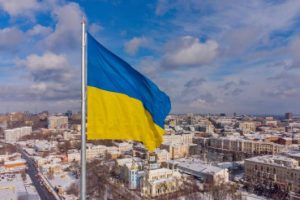What happened to Ukraine’s asylum seekers?
Refugees from around the world, who were living in Ukraine at the outset of the Russian invasion, are struggling to find protection and support in other countries, reports say.
Before Ukraine became a war zone itself, the country was a transit post and destination country for people fleeing conflicts and persecution elsewhere.
Now, according to the Ukrainian refugee aid agencies and the UN immigration agency IOM, these displaced people – who came from Syria, Afghanistan, Russia, the Democratic Republic of Congo and elsewhere – have found themselves among the millions displaced inside Ukraine and in other European nations.
 IOM says that as they seek safety in the EU, these refugees struggle to access the basic protections as well as status resolution, documents, information, and services.
IOM says that as they seek safety in the EU, these refugees struggle to access the basic protections as well as status resolution, documents, information, and services.
In many cases, they are entitled to these things.
Around 5,000 refugees and asylum seekers were registered in Ukraine in 2021. Many lacked documents or were stateless without a safe home country to return to.
And because of backlogs in the Ukrainian asylum system prior to the invasion, only about 100 people were granted protection in the country each year.
Ukraine refugee aid agency ‘Right to Protection’, provided legal support to around 1,500 asylum seekers and refugees in Ukraine.
A survey of 300 of these people who subsequently travelled to the EU from Ukraine, found many had not been afforded the protection and support they were due.
Just days after Russia’s full-scale invasion, The EU’s temporary Protection Directive (TPD) was triggered, providing legal protection to the almost five million people fleeing the war.
But almost four in ten of the non-Ukrainian asylum seekers and refugees we interviewed by ‘Right to Protection’ had not received temporary protection.
“Unless they enjoyed international protection in Ukraine, third country nationals are only eligible for temporary protection if they held permanent residency in Ukraine,” Right to Protection said.
“This de facto excludes asylum seekers and many other vulnerable third country nationals without documents, including most of the 80,000 stateless people who had been living in Ukraine when the war began,” the agency said.
“Refugees with documents in Ukraine are eligible for protection under the EU’s TPD, but EU member states may not recognise or understand their Ukrainian documents.
And 38 per cent of the people interviewed faced delays and obstacles in being granted temporary protection.”
RtoP said some people waited up to five months to receive temporary protection, while the EU Asylum Agency (EUAA) reports that Ukrainian nationals are issued same-day documents in many countries.
“But whether they are eligible for temporary protection or not, all third country nationals arriving from Ukraine have a right to make an asylum claim.” Right to Protection said.
“Yet only a quarter of the respondents in our study knew where to find legal information and assistance. This makes them especially vulnerable as they try to navigate a legal labyrinth of European and national level asylum policies.
“All EU member states have launched mass information campaigns on temporary protection. However, webpages in Ukrainian and Russian are of little help to Syrians and Afghans, the top two nationalities interviewed in our research.
“Without proper access to information or protection procedures, more than 10 percent of the people we spoke to hold no identity or travel documents. They must remain in legal limbo, unable to return to Ukraine to see or retrieve family members, or to access basic services in the EU,” the agency said.
Right to Protection called on EU countries to extend protection to the third country refugees.
“It is not too late for the EU and member states to act to protect all people fleeing Ukraine, whether they hold Ukrainian nationality or not,” the agency said.
“EU member states should use their discretion under the TPD to extend temporary protection to asylum seekers and stateless persons.”












